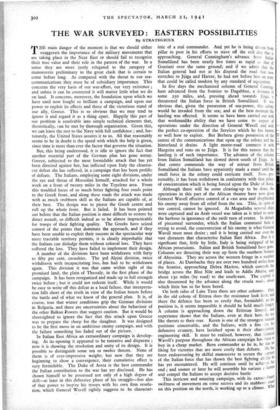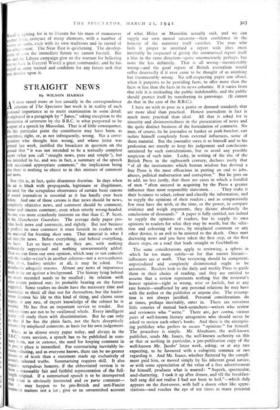THE WAR SURVEYED: EASTERN POSSIBILITIES
By STRATEGICUS
THE main danger of the moment is that we should either exaggerate the importance of the military movements that are taking place in the Near East or should fail to recognise their true value and their role in the pattern of the war. In a sense they are more justly relegated to the category of manoeuvres preliminary to the great clash that is certain to come before long. As compared with the threat to our sea- communications they must be of subsidiary importance. This concerns the very basis of our war-effort, our very existence ; and unless it can be countered it will matter little what we do on land. It concerns, moreover, the foundation upon which we have until now fought so brilliant a campaign, and upon our power to exploit its effects and those of the victorious stand of our ally, Greece. This is so obvious that we may tend to ignore it and regard it as a thing apart. Happily this part of our problem is resolvable into simple technical elements that, theoretically, can be met by thorough organisation. Given this, we can leave the rest to the Navy with full confidence ; and, for- tunately, the United States assures it to us. All that reasonably seems to be in doubt is the speed with which the help is given, since time is more than ever the factor that governs the situation.
But, this being understood, it is idle to ignore the fact that another essential part of the German plan has gone astray. Greece, subjected to the most formidable attack that has yet been directed against her, has inflicted 'Ton Italy the clearest- cut defeat she has suffered, in a campaign that has been prolific of defeats. The Italians, employing some eight divisions, under the eye and threat of Mussolini himself, attacked for a whole week on a front of twenty miles in the Tepelene area. From this troubled focus of so much bitter fighting four roads point to the Greek front, and along these roads the attack was made with as much stubborn skill as the Italians are capable of, at their best. The design was to pierce the Greek centre and roll up the whole front. But it failed. It has been pointed out before that the Italian position is most difficult to restore by direct assault, so difficult indeed as to be almost impracticable for troops of their fighting quality. The Greeks have seized control of the points that dominate the approach, and if they have been unable to exploit their success in the spectacular way more tractable territory permits, it is clearly improbable that the Italians can dislodge them without colossal loss. They have suffered the loss. They have failed to implement their design.
A number of the divisions have been withdrawn with forty to fifty per cent. casualties. The 3rd Alpini division, twice withdrawn with incapacitating loss, has had to be withdrawn again. This division it was that came within sight of the promised land, the plain of Thessaly, in the first phase of the campaign. It has been reorganised and made up to full strength twice before ; but it could not redeem itself. While it would be easy to write off this defeat as a local failure, that interpreta- tion falls short of the truth in view of the Italian boasts before the battle and of what we know of the general plan. It is, of course, true that winter conditions grip the German divisions in Bulgaria, and there are uncertainties about the behaviour of the other Balkan Powers that suggest caution. But it would be shortsighted to ignore the fact that this attack upon Greece was to prepare the sheep for the slaughter. It was designed to be the first move in an ambitious enemy campaign, and with the failure something has faded out of the picture.
In Italian East Africa an extraordinary campaign is develop- ing. At its opening it appeared to be tentative and disparate ; now it is showing the resolution and unity of its design. It is possible to distinguish some ten or twelve thrusts. None of them is of over-impressive weight; but now that they are beginning to show a convergence, their cumulative effect is very formidable. The Duke of Aosta is the best commander the Italian contribution to the war has yet disclosed. He has shown himself to be possessed not only of a high degree of skill—at least in this defensive phase of his struggle—but also of that power to inspire his troops with his own firm resolu- tion, which General Wavell rightly suggests to be character- istic of a real commander. And yet he is being driven from pillar to post in his efforts to stave off the evil day that is approaching. General Cunningham's advance from Italian Somaliland has been nearly five times as rapid as that of Graziani over the same ground; and if we admit that the Italian general had not at his disposal the road that now stretches to Jijiga and Harrar, he had not before him an army that could be called modern by any standard of equipment.
In five days the mechanised column of General Cunning. ham advanced from the frontier to Dagahbur, a distance of some 25o miles, and, pressing ahead towards Jijiga, it threatened the Italian force in British Somaliland. It was obvious that, given the possession of sea-power, this colony would be invaded from the sea; and at the best moment the landing was effected. It seems to have been carried out with that workmanlike ability that we have come to expect of operations under the direction of General Wavell and with the perfect co-operation of the Services which he has known so well how to exploit. But Berbera gives possession of the centre of the communications that open up the colony and the hinterland it drains. A light motor-road connects it with Hargeisa and runs on to Jijiga. It is for this reason that the landing is of such importance. The advance of the column from Italian Somaliland has slowed down south of Jijiga. As that centre commands the way of retreat from British Somaliland the Italians have apparently made a stand until the small force in the colony could extricate itself. Now, pre- sumably, it has been withdrawn in conformity with that policy of concentration which is being forced upon the Duke of Aosta.
Although there will be some clearing-up to be done, the operations in this part of the African theatre have now given General Wavell effective control of a vast area and shepherded his enemy away from all relief from the sea. This, in spite of our control, cannot be ignored. At Mogadishu several ships were captured and an Arab vessel was taken as it tried to enter the harbour in ignorance of the swift turn of events. In default of piecemeal surrender, which the Italian command here is trying to avoid, the concentration of his enemy is what General Wavell must most desire ; and it is being carried out over the vast distances that characterise Italian East Africa. But it is significant that, little by little, Italy is being stripped of her African possessions. Italian and British Somaliland have gone. Columns are thrusting their way up from the southern frontier of Abyssinia. They are across the western fringe in a number of places. At Dambacha they are over two hundred miles from the frontier, approaching Debra Markos, which controls the bridge across the Blue Nile and leads to Addis Ababa, only about 130 miles (by road) to the south-east. The capital is also threatened by the advance along the strada reale, about which little has so far been heard.
On both sides of Lake Tana there are other columns. Only in the old colony of Eritrea does the resistance look firm, and there the defence has been so costly that, formidable as the position is, it seems impossible it should be held much longer. A column Is approaching down the Eritrean littoral, and experience shows that the Italians, even at their best, do not like threats to their rear. Keren is one of the strongest natural positions conceivable, and the Italians, with a fine eye for defensive ccuntry, have lavished upon it their characteristic engineering skill. It must be realised, however, that General Wavell's purpose throughout the African campaign has been in buy in a cheap market. Born commander as he is, he has an liking for victories that are more costly than defeats. He has been endeavouring by skilful manoeuvre to secure the _arm° of the Italian force that has shown the best fighting ablityll.e has yet encountered. He will continue until he achieves his end ; and sooner or later he will assemble his various columns and compel the Italians to accept decisive battle This intricate and amazing campaign, with its extraordinal swiftness of movement on some sectors and its stubborn stand on this position on the north, is working up to a climax. Oat avell is lighting for is to liberate for his mass of manoeuvre other force, compact of many elements, with a number of arious air units, each with its own traditions and its record of achiement. The Near East is quickening. The develop- ats of even the immediate future we cannot foretell. But 's and the Libyan campaign give us the warrant for believing t we have in General Wavell a great commander, and he has ped an army trained and confident for any future task that y devolve upon it.







































 Previous page
Previous page